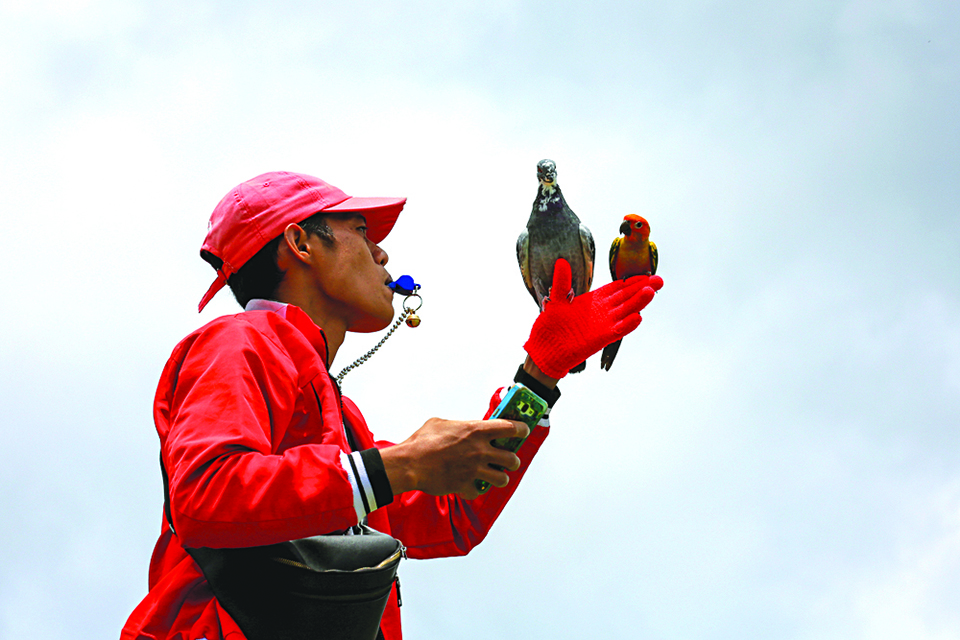THE PROS AND CONS OF FREE FLIGHT
By ALEX BICHARA

Free flight is what it sounds like – and so much more. Free flight involves not only training a Bird to fly freely outdoors, but also ensuring that they’re able to come back once called and avoid dangerous situations when away.
Because of this, human companions of their feathered friends must consider several pros and cons when deciding whether to pursue free flight with their Bird. Here are a few of them.
PROS OF FREE FLIGHT
YOUR BIRD’S WINGS
WON’T HAVE TO BE CLIPPED
Wing clipping refers to the trimming of a Bird’s “flight feathers” or primary feathers, which would prevent the Bird from flying around a house or out a window. Confining them indoors and not allowing them to fly would also increase their dependency on their human companions, possibly nurturing the Bird’s relationship with those around them.
However, according to a 2020 article from The Spruce Pets, many argue that wing clipping could hurt Birds physically and psychologically. Lack of flight could negatively affect their ability to exercise, stimulate their minds, and generally enjoy freedom.
YOU CAN BOND WITH YOUR BIRD
Free flight requires quite a lot of training and operant conditioning, in which an action or behavior is typically followed by positive reinforcement so that the Bird understands what they should do in specific situations. This means one would have to reward their Bird with treats, playtime, and compliments after every successful training session.
The Bird resource website HereBird also states that one would need to understand their Bird’s body language. This would entail spending time with the Bird to figure out what makes them anxious or scared, and what these emotions might look like when they’re outdoors. Perhaps dark clouds make them nervous or animals nearby get them angry. According to HereBird, a Bird must feel comfortable enough to free fly, or else the session must be halted.

YOUR BIRD WILL HAVE FREEDOM
According to what Dr. Susan Orosz wrote in 2016 for the LaFeber Company, the freedom a Bird gets during free flight can positively affect them physically, mentally, and psychologically.
Birds who aren’t able to do much flying have often been found to have bone loss or metabolic bone disease. Flight is a type of exercise that is both natural and powerful enough to result in multiple benefits, including mental stimulation. The greenery that a Bird would pass by during free flight, the wind in their feathers, and the sunlight on their face could stimulate their mind in ways staying home would not.
It’s also important to think about what your Bird needs psychologically considering they, too, are intelligent animals whose lives can be enriched by the outside
A BONE TO PICK
Birds who aren’t able to do much flying have often been found to have bone loss or metabolic bone disease.
CONS OF FREE FLIGHT
YOUR BIRD MIGHT MEET PREDATORS
This is perhaps the most common concern among Birds’ human companions, both those used to free flight and those who have yet to try it. Hillary Hankey of Avian Behavior International writes, “Every day for a free flying bird is a new day; just because they went unscathed yesterday does not necessarily lessen the risk for today.”
Your Bird might meet predators one day and be completely safe on another. If you catch your Bird getting tired while flying away from a bird of prey, calling them to return could also be dangerous because they wouldn’t have much time to land.
Some seasons could also be dangerous for free flying Birds; nesting season would mean more Birds acting territorial and aggressive.
STRENGTH IN NUMBERS
Hankey suggests free flying several birds at a single time to stop chases from occurring. It seems there’s strength in numbers, even in the sky.
THERE ARE FACTORS YOU CANNOT CONTROL
Indoors, one would only have to worry about themselves and
their Bird. Outdoors, they’d also have to consider the weather, the space, any power lines that hang above them, the number of cars on the road, and whether there are aggressive animals nearby, among others
Factors such as rain or traffic might not seem too dangerous but could greatly affect a Bird’s ability to fly or land. Thunder might make them panic and hide somewhere far away from home, and even glass windows could pose a threat to a Bird who hasn’t encountered many of them.
STRANGER DANGER
Sometimes, humans themselves are the problem; not everyone is a fan of Birds.
YOUR BIRD MIGHT MATE AND NEVER RETURN
According to Hankey, free flight is a whole different challenge when it comes to sexually mature Birds. Your Bird might form a bond with another from the same flock or seek out a nest, either successfully mating or getting lost.
This is the reason some human companions choose to ground their Birds during nesting seasons or when the Birds’ urge to mate is particularly evident.
FREE FLYING IS POSSIBLE
The possibility for free flight depends on a number of variables including the Bird’s species, the training method, and the determination of the Bird’s handler.
With patience, trust, proper training, and lots of time, you and your Bird might even be able to reap the pros of free flight without experiencing any of the cons.





